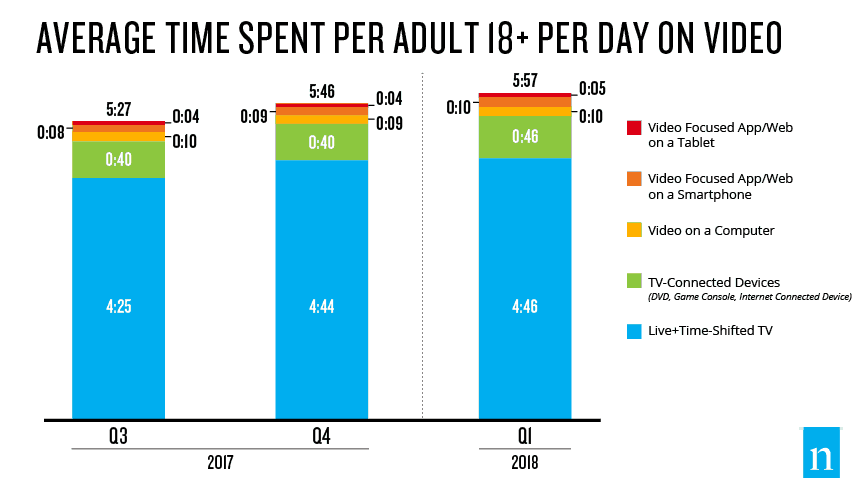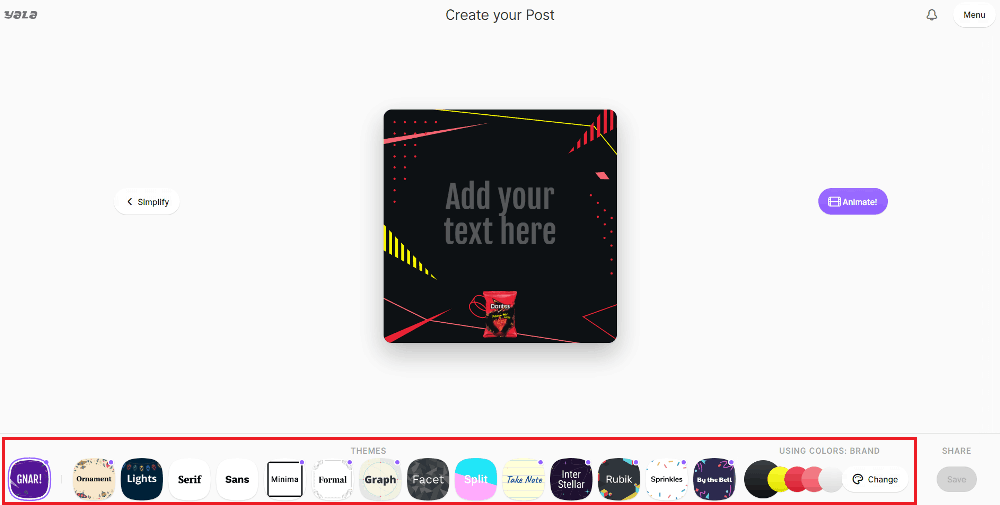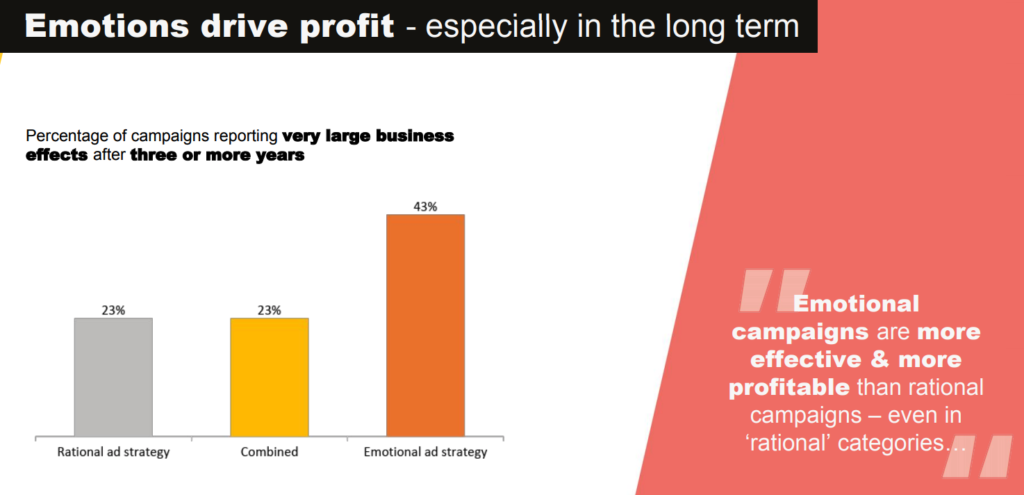[ad_1]
The most successful companies are those that value soft skills in their leaders. But what is it about soft skills that brings about success? And what, exactly, are soft skills anyway?

Placeit Alebrije Design
The Athena Doctrine is a New York Times best-selling book by John Gerzema and Michael D’Antonio. During the process of writing their book, the authors surveyed 64,000 people in thirteen different countries. Two-thirds of those people said they thought the world would be a better place if men thought more like women.
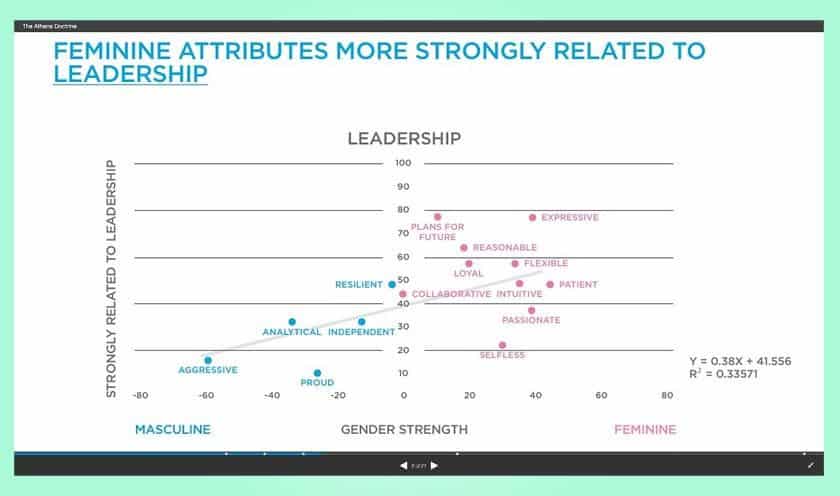
Source https://www.slideshare.net/johngerzema/the-athena-doctrine
Gerzema and D’Antonio also asked 30,000 people to rate 200 traits on whether they were feminine or masculine. Below are the results:
Feminine traits:
- Reasonable
- Flexible
- Patient
- Collaborative
Masculine traits:
- Resilient
- Analytical
- Independent
- Proud
In this post you’ll learn:
- What soft skills are.
- Why soft skills can make a change in you and your teams.
- How team leaders can teach soft skills to their teams.
- How to measure results and share them.
What Are Soft Skills?

Placeit Alerbrije Design
Where Does the Term “Soft Skills” Come From?
The concept of “soft skills” was first mentioned in 1972 in a US Army training manual. That same year, Dr. Paul G. Whitmore presented his research findings at the CONARC Soft Skills Conference. In his research, Dr. Whitmore had used a questionnaire that concerned skills in the areas of command, supervision, counseling, and leadership. As he analyzed the answers to the questionnaire, he classified them as either hard skills or soft skills.
He concluded, “Soft skills are important job-related skills that involve little or no interaction with machines and whose application on the job is quite generalized.” However, this description leaves the impression that soft skills are weak and ineffective. Nothing could be further from the truth.
Since that time, general understanding of hard and soft skills has evolved. In fact, many employers now look for soft skills in job-seeking candidates. Plus, they’re more likely to hire a candidate who appears to have well-developed soft skills over a candidate who presents with mostly hard skills.
What Is the Difference Between Hard Skills and Soft Skills?
Hard skills are those skills a person acquires through formal education and training programs. For instance, obtaining a degree or a certificate is an indication of a certain set of hard skills. Other examples include knowledge about machine operations and computer programming.
On the other hand, soft skills are productive traits such as social skills. Commonly considered feminine traits, you can use soft skills to improve your social interactions and enhance your career.
However, just because soft skills appear to come more easily to women doesn’t mean that only women are entitled to them. These are traits that men have as well. It’s just that many men must learn now to develop and use the soft skills they already have.
Use These Five Soft Skills to Engage with Your Team

Placeit Alebrije Design
While multiple soft skills have currently been identified in academic literature, there are five major skills that will make a difference in your leadership style. Moreover, they will be useful anywhere.
When you use these skills, you’ll be able to understand situations that might have been a problem for you in the past. Additionally, you’ll improve communication and begin to have a different perspective when you encounter a difference of opinion in another person. You might even change your thoughts without feeling as if you have failed as a leader.
1. Empathy
Empathy is about understanding what other people are feeling and making a true connection. It’s a vulnerable choice, since it will require you to remember a similar experience of your own. Empathy also requires a suspension of judgement . You must also learn to withhold any advice or feedback. Simply attempt to understand what the other person is going through.
Theresa Wiseman, in the Journal of Advanced Nursing, identified four attributes of empathy:
- See the world as others see it.
- Understand another’s current
feelings. - Avoid judging while listening.
- Communicate the understanding.
According to Brené Brown, PhD, LMSW, of the University of Houston, “Empathy is feeling with people.”
2. Tolerance
Tolerance is the willingness to endure the existence of an opinion or belief in another that you don’t agree with. To put this particular soft skill into practice, try to understand where the other person is coming from before giving your own opinion.
For example, remember a time when your team rejected one of your ideas. How did that make you feel? Did you give yourself the chance to listen and change your thoughts? Did you try to incorporate your team’s feedback into your thinking?
Here are some
tips on how to grow your tolerance:
- Apply empathy. Try to understand another’s point of view.
- Ask for a full explanation to understand more. Don’t guess.
- Use “I” statements instead of “you” statements when trying to understand someone’s point.
- Value diversity. Learn about cultures other than your own. Open your mind.
- Analyze your feelings and strive to understand what is causing them.
- Make a lack of self-esteem isn’t affecting your judgment.
3. Collaboration
Collaboration is the process of two or more people working together for the same purpose through different tasks. This sounds simple, but it can be difficult to put into practice. However, a good leader can guide a team toward fulfilling their common goal.
Follow these steps to have effective collaboration in your team:
- Make sure everyone on the team has the information they need and knows how to complete their tasks.
- Make your expectations clear from the beginning.
- Use task management tools to create clear goals for each member.
- Acknowledge everyone’s strengths.
- Huddle during projects so that each member remains in the loop.
- Recognize and reward collaborative behaviors.
A good example of collaboration is when a team member prioritizes a task that he or she knows affects their partner’s performance.
RELATED ARTICLE: 5 AMAZING STATISTICS ABOUT REMOTE COMPANIES
4. Effective Communication
One of the most critical of all the soft skills is effective communication. This is all about delivering and understanding messages correctly.
For example, effective verbal communication is more than just talking. You must know how to express an idea. You must also listen and know how to negotiate.
Additionally, learn to pay attention to body language. Body language plays a big part in what you are saying. For example, you could verbally say you like someone’s idea. However, if you say that with crossed arms, you might appear skeptical to the other person.
Below are some tips from Carol Kinsey Goman, PhD, author of The Silent Language of Leaders: How Body Language Can Help.
- Boost your confidence with a power
pose. - Show that you’re listening. Make
eye contact with the person who is speaking. - Remove barriers by taking away
anything that blocks you from your team. - Shake hands to create an instant
human bond. - Smile! This simple action makes
you approachable and trustworthy. - Mirror expressions to show
agreement. In other words, subtly let your body take on postures similar to the
ones of the person you’re talking with.
Make your communication objective by choosing the right words. When listening, rephrase and repeat to the other person what you understood. This will help to create a clear communication flow.
5. Flexibility
Flexibility is all about the willingness to change deeply held beliefs and opinions. It is about modifying your ideas about the way you do your work and make decisions. It’s about changing the way you expect results in your life. Being flexible lets you accept change while also being creative so as to come up with new solutions that meet the current challenge.
Flexibility might sound easy. However, frustration can get the best of you in challenging situations. There no magic pill that will make you flexible overnight.
The best thing you can do is to be patient with yourself. If flexibility doesn’t come easily to you try to remember that you’re learning a new soft skill.
Therefore, every time you come across a situation you didn’t plan on and you find yourself trying to resist the outcome, explore your emotions around the situation. Be present. As soon as you are able, let go of what you can’t control. The faster you let go of old ideas, the quicker you will be able to move forward.
Encourage Team Members to Master Soft Skills
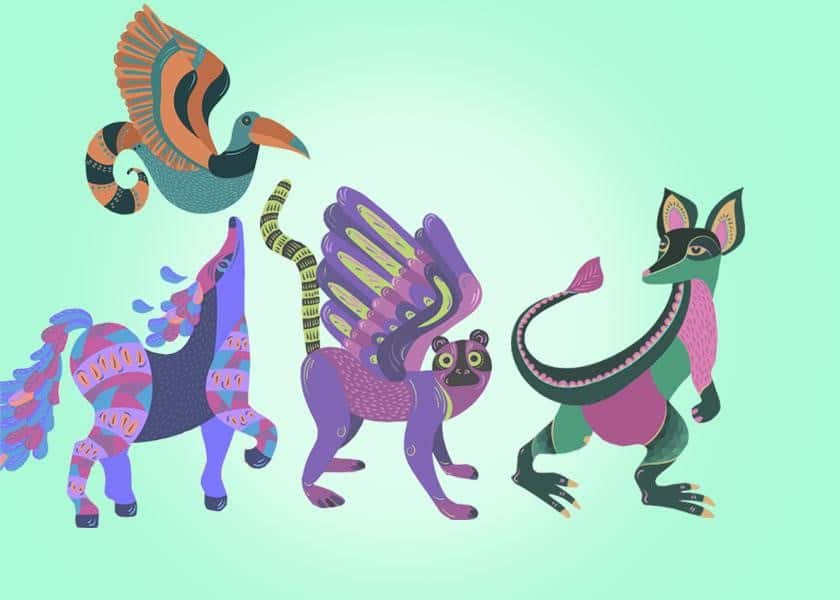
Placeit Alebrije Design
Everyone has every soft skill we have discussed in this article. Moreover, everyone has the ability to become more aware of the soft skills they already have. However, just because you gain awareness of the soft skills you have doesn’t mean you suddenly master them all.
First, you must understand each skill. Then, you must begin to apply each one. With experience, you will learn more about yourself. You will improve as time goes on.
When you begin to feel confident about your mastery of soft skills, the next step is to pass these skills on to your team. However, teaching them will bring on another big challenge. But the good news is that once you have your own experience to talk about, you will find it easier to explain these skills.
You’ll need to remember, though, that every person learns at their pace through their own experiences. Therefore, be patient and approachable. Continue to guide your team through this learning phase.
Some Tools for Teaching Soft Skills to Your Team
Start with Regular Group Talks
Institute weekly group talks, perhaps each Monday morning, with the goal of teaching the concept of soft skills. Focus on one soft skill each week.
Prepare a relaxed space for these meetings, possibly offering coffee and breakfast. Try to keep them relaxed and focused.
Use a slideshow to teach each concept. In your presentation, include a description of the soft skill you are teaching about. Use images and video to provide real-life examples.
After your presentation, open the discussion by asking a team member for their thoughts. Have they applied that skill recently? Alternatively, you could ask team members to investigate the term before that week’s talk. Ask members to share with the team what they learned.
Use Email Surveys to Evaluate the Team
Use weekly email surveys to reinforce the soft skill of the week. Let the team know that practicing this skill will add value to their professional profile. You can create your surveys with Google Forms and send them out at the end of each week.
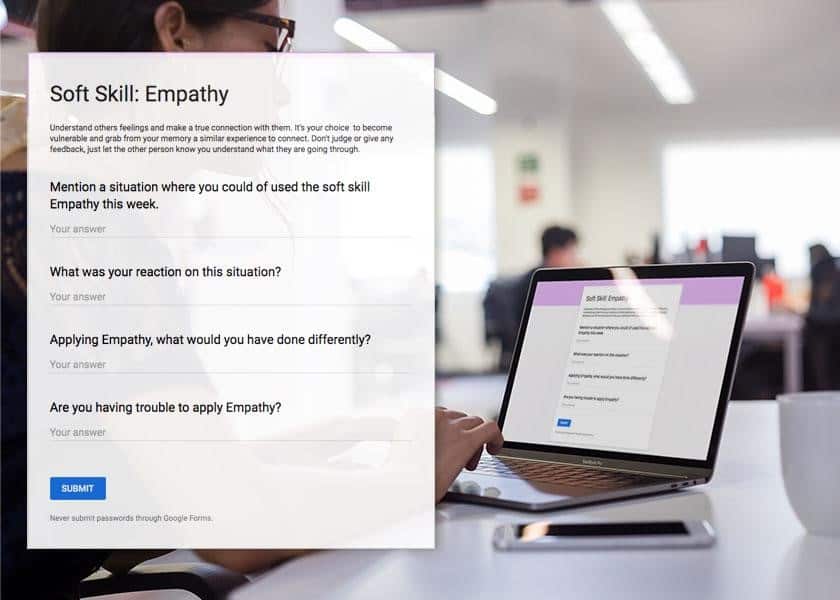
Placeit Mockup
Keep each survey short and to the point. However, be sure to include an explanation or definition of the skill at the beginning of the survey. Include only the following three questions, and use team members’ answers to evaluate their understanding of the skill:
- How have you experienced this skill during this week?
- Are you having trouble understanding and applying this skill?
- If you have had no experience with this skill this week, what will you do differently next week?
Promote Positive Feedback Among Peers
After a few weeks, divide your team into pairs and ask each person to give their partner feedback about how they’ve used the soft skills the team has been learning about. It’s essential that you conduct this exercise in a relaxing space. Afterward, gather as a group to talk about what everyone has learned.
The rules for
this activity are simple:
1. Each pair should answer these two questions:
- Which skills do they see in their partner and why?
- Which skills do they think the other person needs to improve on? Remind everyone to be positive as they give advice to their partner about how to improve.
2. Have each person write down the feedback they receive from their partner. This way each person can reflect on the feedback in private.
3. As the team leader, walk around the room and listen in on each conversation. Make sure all communications remain objective and respectful. Give some guidance if a pair seems too quiet or if a pair appears to be becoming upset.
Create Eye-Catching Internal Campaigns
Create internal campaigns to promote the idea of practicing soft skills. An internal campaign could be a simple newsletter, or it could be projecting slideshows or videos in common areas.
Come up with simple phrases about what soft skills are and use them as reminders to all team members. Make sure each phrase can be read in a glimpse.
For example, if empathy is your soft skill of the week, your phrases might be something like, “Use empathy to understand others,” or “Empathy is about understanding others’ feelings.” Another phrase might be, “Empathy is not judging, just feeling.”
Select a Format for Your Message
What is the best canvas for your message? Make it into a poster, send it out in an email, or create a video. Be creative and come up with other ideas.
Use Online Tools to Create Fast Content
Use online tools to create your content quickly and make it look more professional. For example, use templates on an email platform such as MailChimp. Or use a video maker to create and deliver a video within minutes. You can also find online design tools to help with creating posters and flyers.
RELATED ARTICLE: STANDUPLY WITH SLACK FOR SYNCHRONICITY IN TEAMS
Decide How to Communicate the Message
Once you have your material ready, whether it’s digital or printed, decide how best to communicate it. For example, you could place posters in common areas or send out personalized emails.
Measure Results and Share Them with Other Team Leaders
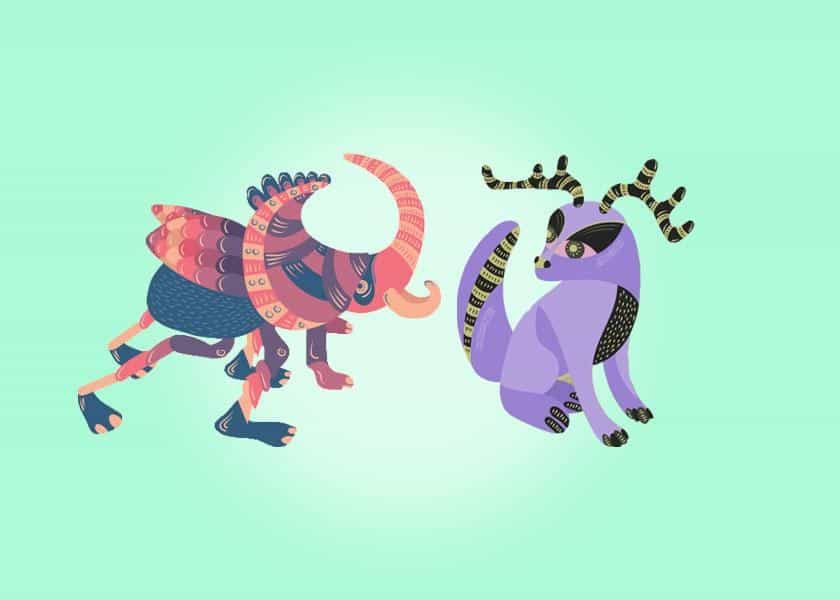
Placeit Alebrije Design
Soft skills aren’t easy to measure. However, followup is still important. Therefore, have one-on-one meetings with each team member. Ask each person directly how they felt about applying their new skills. Further question them about which soft skills they think they need more practice with.
Additionally, It would give each person feedback and tips about how to further develop their soft skills. Share an example from your own life of what you did to develop that skill. Assign some good reading about a specific skill or assign them tasks that can help them develop the soft skill they’re weakest in.
People with Soft Skills Can Become the Company’s Greatest Asset
The time has come to think and lead differently. Soft skills will help you and your team to understand each other better, work more efficiently, and welcome positive change.
Start with teaching your team soft skills such as empathy, tolerance, collaboration, communication, and flexibility. These skills alone bring about a happier workplace. What’s more, its effects will bring improvement throughout the company.
About the Author
Veronica Madrigal is co-founder
of GeekGirlsMX, a community for women in tech. She currently collaborates as
content creator at Placeit.net where she writes about entrepreneurship, design,
and technology.
[ad_2]
Source link



 Listening to the Voice of the Customer
Listening to the Voice of the Customer 












